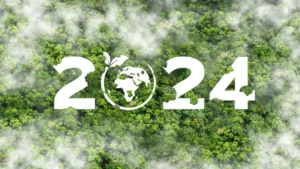
Azerbaijan’s President Ilham Aliyev has declared 2024 to be a “green world solidarity year” ahead of the COP29 Conference that will be held this year in his country. The declaration aims to showcase how Azerbaijan is a global partner in the struggle against global climate change. Azerbaijan has set ambitious targets, aiming to reduce greenhouse gas emissions by 35 percent by 2030 and 40 percent by 2050, relative to the 1990 baseline year.
Recently, Azerbaijan showcased to a delegation brought over by UNDP and Anama the newly created “smart village” in East Zangezur, which seeks to assist ecosystem restoration. Similar models are being employed throughout Karabakh and Nachshivan, which have been declared “green energy zones.” Focusing on energy policy, Azerbaijan prioritizes the creation of green energy sources and the global distribution of green energy. The goal is for renewable energy to constitute 30% of electricity generating capacity by 2030.
The office of the president of Azerbaijan declared: “The unanimous decision to host the 29th session of the Conference of the Parties to the United Nations Framework Convention on Climate Change (COP29) in Azerbaijan reflects the international community’s profound respect and trust in Azerbaijan, recognizing the nation’s endeavors in environmental protection and addressing climate change on national, regional, and global scales.”
According to USAID, “Azerbaijan is an emerging middle-income country. The agriculture sector contributes only 7 percent of GDP but is a critical component of the non-oil economy. As a key source of jobs and a priority in the context of food security, Azerbaijan’s agriculture sector will be increasingly at risk from higher temperatures, unpredictable rainfall and natural disasters.”
They added: “The country’s rapid economic development created a number of environmental challenges that will be exacerbated by climate change, such as severe air pollution from industrial plants, water pollution, soil degradation and important biodiversity and forest reserve degradation and losses. Another major risk to economic development and the population is the increase in frequency and intensity of natural disasters. Azerbaijan is considered to be one of the most flood-prone areas in the world and extreme events, mainly floods, landslides and mudslides cost Azerbaijan an estimated $70–80 million annually.
The Azerbaijani Ministry of Ecology and Natural Resources told the UN: “Upon ratification of the UN Framework Convention on Climate Change in 1995 and the Kyoto Protocol of the Convention in 2000, the Republic of Azerbaijan has actively joined international efforts to mitigate the negative impacts of global climate change. As a non-Annex I country, Azerbaijan has undertaken the obligations such as preparation of inventory of anthropogenic greenhouse gas emissions and emission removals, its regular updating, and the preparation of national communications and submission of this information to the Secretariat of the Convention, as well execution of public awareness activities.”
They continued: “All these commitments are fulfilled in a systematic manner. Despite the fact that Azerbaijan is not included to Annex I group under the convention and has not taken any quantitative obligations in accordance with Kyoto protocol, the country has already contributed and is continuing to contribute to the global emission reduction efforts. So far, a number of mitigation activities have been implemented in Azerbaijan such as suspension of using black oil for power stations by using gas instead, application of smart cards in electricity and gas consumption measuring devices, enhancing application of renewable energy sources and energy efficient technologies, expansion of forest territories, etc.”
According to them, “Azerbaijan has recently submitted its intended nationally determined contributions and, as developing country, taking into account national circumstances, future development perspectives and national interests, has taken target of the 35% reduction in the level of greenhouse gas emissions by 2030 compared to 1990/base year as its contribution to the global climate change efforts.”